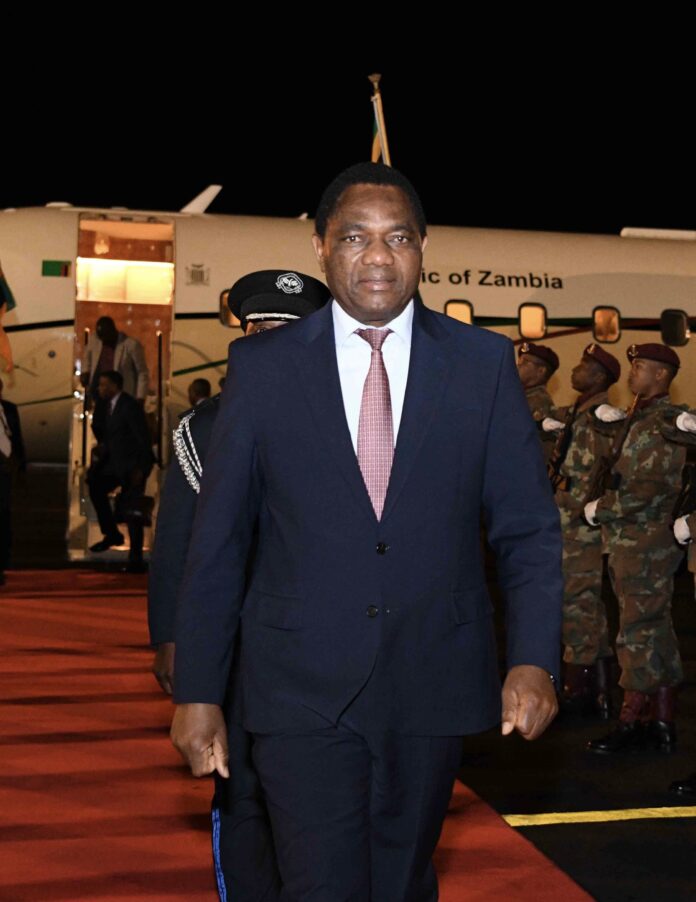By Simphiwe Zungu
The death of a former head of state is traditionally a moment for a nation to pause, reflect, and unite in collective mourning. It is an opportunity to honor a leader’s legacy and to demonstrate national cohesion. However, the passing of former President Edgar Chagwa Lungu on June 5, 2025, has instead exposed deep political fissures in Zambia. President Hakainde Hichilema’s administration has not only failed to honor this opportunity for unity but has actively transformed it into a political crisis.
Edgar Lungu, who served as Zambia’s sixth president from 2015 to 2021, passed away in Pretoria, South Africa, after a prolonged illness. His daughter, Tasila Lungu, confirmed his death, appealing to the nation for unity and dignity during the mourning period. She invoked her father’s commitment to the spirit of “One Zambia, One Nation,” a motto that has historically symbolized national solidarity. Yet, the government’s response has starkly contrasted this appeal.According to multiple sources, Zambian government officials instructed hospital staff not to release information or documents to the Lungu family, declaring that the matter was now being handled strictly as a “state funeral.” This move effectively sidelined the family and the Patriotic Front (PF), the party to which Lungu belonged, from participating in funeral arrangements. PF Secretary General Raphael Nakacinda condemned this exclusion, stating that the funeral of a former head of state cannot be orchestrated behind closed doors. He emphasized that the family, the party, and the people of Zambia deserve transparency and inclusion, arguing that anything less is an affront to democracy and national unity.
President Hichilema’s administration has been accused of using the funeral as a tool for political control. The declaration of a “state funeral” without consulting the Lungu family or the PF has been perceived as an attempt to erase Lungu’s legacy and to consolidate power within the ruling United Party for National Development (UPND). This approach mirrors broader concerns about the erosion of democratic norms under Hichilema’s leadership. Critics argue that the government’s actions reflect a pattern of marginalizing dissent and suppressing opposition voices. The exclusion of the Lungu family from funeral arrangements is not an isolated incident but part of a larger strategy to delegitimize the PF and its supporters. By controlling the narrative surrounding Lungu’s death and funeral, the government seeks to diminish the influence of the opposition and to present a unified front under the UPND. This tactic undermines the democratic principle of political pluralism and threatens the fabric of Zambia’s democracy.
The government’s handling of Lungu’s death has sparked outrage both within Zambia and among the diaspora. In South Africa, a protest under the banner “Suffering Lungu, Even in Death” was organized outside the Zambian High Commission in Pretoria. Organizers stated that the protest was not just about Lungu’s treatment in death but about a broader crisis of governance under Hichilema. Protesters accused the administration of tribal favoritism, elite-driven economic policies, repression of the media, and silencing of political opponents. One protester remarked, “We are not mourning just a man — we are mourning our democracy.” This public outcry underscores the deep-seated dissatisfaction with the government’s approach and highlights the growing perception that Zambia’s democratic institutions are under threat. The administration’s dismissal of public concerns and its refusal to engage in meaningful dialogue with opposition parties and civil society organizations further exacerbate the crisis.
The events following Lungu’s death reflect a troubling trend in Zambia’s political landscape. President Hichilema, who once championed democratic reforms and national unity, now stands accused of undermining the very principles he espoused. His administration’s actions suggest a shift towards authoritarianism, characterized by the centralization of power, the suppression of dissent, and the marginalization of opposition voices. The government’s refusal to include the Lungu family in funeral arrangements is emblematic of this broader pattern. It signifies a disregard for democratic norms and a willingness to exploit state power for political gain. This approach not only damages the legacy of a former president but also erodes the public’s trust in the institutions that are supposed to serve them.
The death of Edgar Lungu presented an opportunity for the nation to come together, to heal old wounds, and to reaffirm its commitment to unity and democracy. Instead, the government’s actions have deepened divisions and fueled political tensions. By excluding the Lungu family and the PF from the funeral process, the administration has squandered a chance for reconciliation and has instead turned a solemn occasion into a political battleground. This missed opportunity is particularly poignant given the historical context. In 2022, President Hichilema invited former President Lungu to participate in the state funeral of former President Rupiah Banda, signaling a willingness to set aside political differences for the sake of national unity. However, the current situation reflects a stark reversal of this approach, highlighting the administration’s selective application of principles and its preference for political expediency over genuine reconciliation.(
To restore trust and credibility, President Hichilema must acknowledge the missteps of his administration and take concrete actions to address the concerns raised by the Lungu family, the PF, and the public. This includes ensuring transparency in the funeral arrangements, facilitating the participation of the Lungu family and the PF, and engaging in meaningful dialogue with opposition parties and civil society organizations.
Furthermore, the administration must recommit to upholding democratic norms and principles, including the protection of political pluralism, the freedom of expression, and the independence of institutions. Only through such efforts can Zambia begin to heal the divisions that have been exacerbated by the government’s actions and work towards a more inclusive and democratic future. The death of Edgar Lungu should have been a moment for Zambia to unite in collective mourning and reflection. Instead, it has exposed deep political divisions and highlighted the erosion of democratic norms under President Hichilema’s administration. By turning a solemn occasion into a political crisis, the government has not only dishonored the memory of a former president but has also undermined the democratic principles that are essential to the nation’s identity. It is imperative that the administration takes immediate steps to rectify this situation and to restore the public’s faith in Zambia’s democratic institutions.
The people of Zambia deserve a government that prioritizes unity, transparency, and respect for democratic values. Only by embracing these principles can the nation hope to overcome the current crisis and build a future that honors the legacy of all its leaders, regardless of political affiliation.


